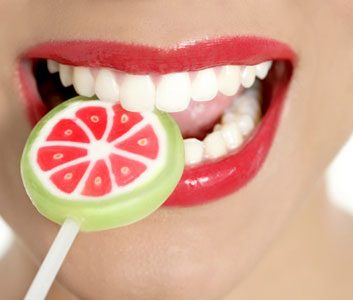
Slow down
By slowing down to enjoy our meals we don’t only improve our digestion, we also improve our oral health. “The mouth is a gateway to the body,” explains Dr. Christine Botchway, a dentist based in Edmonton, “so that’s where we see lots of signs of systematic disease.” She says that when we eat too quickly – wolfing down a meal while driving or standing by the fridge, for example – our food doesn’t have a chance to break down properly before continuing on its journey. By eating more slowly, we give it lots of time to mingle with our saliva, making it more readily digestible in the stomach. “When we eat too fast, we don’t chew enough, and we’re not relaxed, which can mean the food isn’t as well broken down as it could be. That can lead to a number of issues, from poor nutrient absorption, which can affect oral tissues, to acid reflux, a stomach problem that can affect the teeth.”

Watch how much you consume
When it comes to consuming sweet or sticky food, frequency counts as much as quantity when it comes to keeping cavities at bay. “The longer you keep those kinds of foods in your mouth, the worse it’s going to be,” explains Dr. Tony Iacopino, dean of the Faculty of Dentistry at the University of Manitoba, and a professor of restorative dentistry. That’s because the longer you keep sugary foods in your mouth, the longer you’ll be creating acidic conditions – bacteria metabolize that sugar and create acid that will wear away at your tooth enamel. Adds Dr. Botchway, “If we eat sugars frequently, we are bathing our teeth in sugar, and that means that they are in a constant state of breakdown.” Since so much of our food is processed and contains hidden sugars, we can end up eating much more of it than we anticipate.

Eat the sweet stuff with your meal
It may sound counter-intuitive, but the best time to indulge in sweet, sticky foods like candy is right before a meal. That’s because the saliva you’ll generate with your main course will help wash sugars away from your teeth. Eating your sweet stuff immediately after a meal (dessert, anyone?) is a good bet too, because there will still be lots of saliva moving around in your mouth. If you’re a pop drinker, limit consumption to meal time.

Rinse (or chew) after you eat
Obviously, brushing your teeth after a meal is best, but if that isn’t an option, rinse out your mouth after eating. “If you can’t do that, the best thing to have at the end of a meal is a piece of cheese,” says Dr. Iacopino, explaining that cheese neutralizes the acid that does damage to teeth. Munching on an apple (or any crunchy, fibrous food) is a good bet too, because it gets the saliva going and helps clean the teeth, mouth and tongue. Sugar-free gum also helps stimulate salivary flow, which will reduce enamel-wearing acid in your mouth.

Drink more water
It may sound simple, but drinking lots of water will ensure you keep your mouth hydrated through the day. Dr. Botchway recommends drinking water with every meal, to help wash everything down. She also suggests sipping on it throughout the day instead of pop (a sugar bath for your teeth!) or caffeinated beverages, which can be dehydrating (coffee and tea can also lead to permanent stains on the teeth). “When our mouth is dry, we don’t have that nice water-flow to wash stuff away,” Dr. Botchway says, explaining that dry tissues are not as healthy, and can allow bacteria to breed.

Sip with a straw
If you are going to slurp back the odd sweet or acidic beverage, use a straw! You may feel like a child, but sipping your soda through a straw can help minimize the amount of time it has contact with your teeth.
